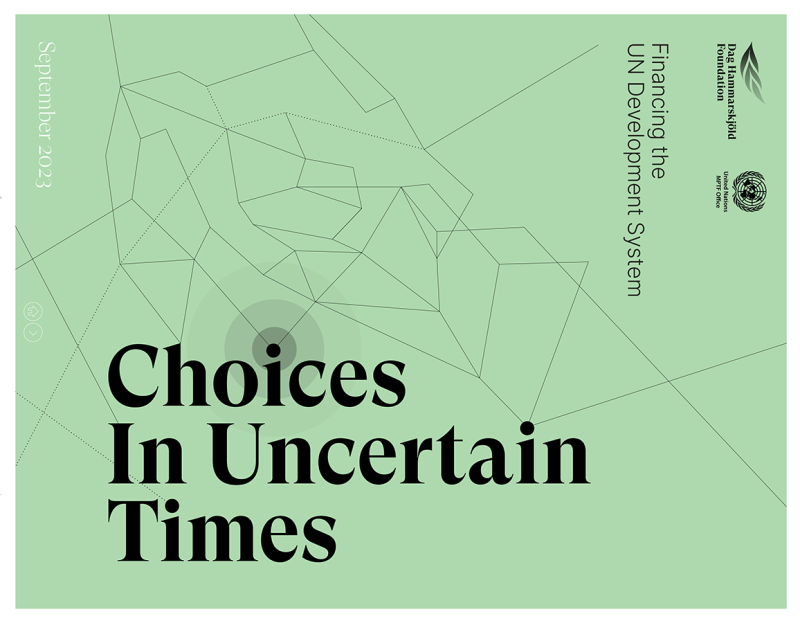

New York, NY, USA –The ninth edition of the Financing the United Nations Development System report: Choices in Uncertain Times was released October 17, 2023 by representatives from the Dag Hammarskjöld Foundation, United Nations MPTF Office, UNSG High Level Advisory Board, and OHCHR.
The report focuses on SDG financing and multilateralism at a time when longstanding and hard-fought development achievements are at risk because of a flurry of global and local humanitarian, development, security, and sustainability challenges that place additional demands on the 2030 Agenda.
Published by the Dag Hammarskjöld Foundation and the UN Multi-Partner Trust Fund Office, Choices in Uncertain Times helps readers understand how varied strategies can strengthen financing of the multilateral development system. Findings and recommendations outline effective financing responses to global needs and stimulate critical reflection for evidence-based decision making on mobilizing quality development financing.
“With strong support from the Swedish government, MPTF Office, and UN system we made financing data accessible in this report, complementing that data with a marketplace of ideas,” said Henrik Hammargren, Executive Director of the Dag Hammarskjöld Foundation. “Given these uncertain times, strengthening multilateral multilateral collaboration is critical for developing sustainable responses to the global challenges we see.”
Turning crises into opportunities
The report offers an extensive analysis of the UN development financing system with insights from international institutions, the private sector, UN experts, government officials, civil society, and academia. It highlights the crucial need for multifaceted engagement to strengthen multilateral collaboration, both of which are vital to effectively negotiate global challenges and address existential risks. In uncertain times, global crises can serve as catalysts to increase investment in the multilateral system and tackle underlying risks.
“The ninth edition underscores the need for evidence-based choices when sourcing funding to tackle today's global challenges,” said Jennifer Topping, Executive Coordinator of the MPTF Office. “With demands on the UN increasing, the report highlights the facts up front and need for reliable and flexible financing at-scale and increases in multilateral engagement and commitments to multi-stakeholder collaboration. The report delves into the big picture of international flows where scaling quality, flexible core and pooled funding is critical to fulfil international mandates and realizing the SDGs."
As outlined by report authors, crises are an opportunity to allocate resources more effectively at-scale to build resilience, mitigate hazards, and prevent armed conflicts. Financial commitments are fundamental to achieve the 2030 Agenda, however, securing the “right type of funds” requires the UN and Member States make evidence-based assessments, decisions and choices to realize the SDGs.
What we need: Quality and robust funding
2021 was the first year in a decade that the real value of UN revenue fell relative to the previous year, from $62.6 billion US dollars to $62.3 billion. Despite the growing demand for United Nations support amidst numerous, simultaneous global crises, gaps in UN action, funding needs and actual value of available funding have become more prominent. As such, the UN requires robust and flexible financing to satisfy growing operational demands and provide relevant responses to increasingly complex, intersectional and ongoing global challenges.
Investments in development and sustainability, backed by strong financial commitments, are more essential than ever to fulfil the 2030 Agenda. The report highlights the significance of various funding instruments with a focus on core and pooled funding. While the preservation of core funding is critical to uphold international mandates, norms, and expertise—and ensure the seamless continuity of critical interventions—adequate pooled funding facilitates collective solutions for addressing the intersectional nature of the SDGs. All financing instruments are necessary for development stakeholders to design effective responses that will help us achieve the Global Goals.
The report is available for download on the MPTFO Gateway. Interactive datasets and compilation of articles from previous years are available online at https://www.financingun.report/.
Between Fall 2023 and Spring 2024, in-person and online discussion briefings will be organized to cover report-related issues and findings.